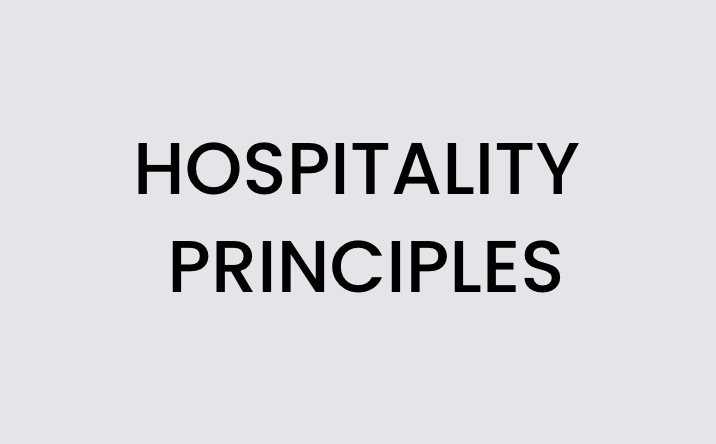
Charlottesville Front of House
Meet the Management Team
-

Julia Daugherty
Director of Operations/General Manager
-

Laura Taylor
Bar Manager
Relationships
Developing and maintaining relationships is an integral skill that will define your success at the club, as well as a skill that will serve you far beyond the walls of the club. Though success and failure will affect your relationship with others, the trust established between you and them will be even more important. It is essential for others to know how much you care and for that to come through both in your mistakes and victories. Establishing trust and showing others you care will be the most important objective that, once achieved, will position you to master your environment and excel at your job. Be aware of how your own self perception and what others think of you may not match up, so try your best to be tuned in to both.
-
Your supervisor’s success is directly related to your own, since they are indirectly or directly responsible for everything you do, plus a little more. A good relationship with a manager is where you each trust each other to do your jobs. When someone fails, the other will lend a helping hand. Too much or too little attention from your manager is undesirable. Think about your political capital like a bank. You need to deposit more than you withdraw to gain wealth. The better your relationship is with your manager the more they will teach you and support you in your pursuits.
Tips:
Be impressive
Don’t be insubordinate.
Solve problems and don’t create extra work.
Say yes, you can’t lose.
Be professional and respectful at all times.
Avoid volunteering excuses unless asked for one.
Always accompany complaints with suggested solutions.
Be a leader to your peers.
Communicate well (concise, deliberate, good intentions)
-
You want the chef to feel more confident in service because you are there. He wants you to appear to be as committed to your job as he is to his. It should be rooted in your commitment to strengthening our operations and our product. A strong kitchen is essential to our success, and you can help make it stronger with a good relationship with the chef.
Tips:
Say hi by name to everyone in the kitchen when you arrive.
Exceed the intensity of the kitchen in your movements and language. “Right NOW Chef!”
Communication: minimize your words. Speak clearly and deliberately. Don’t socialize.
Leave the kitchen cleaner than how you found it.
Minimize errors, especially those that make the kitchen adapt for your mistake.
Know the menu. Ask questions (at an appropriate time). When you show your interest and respect, you will earn both in return.
When you ask for a menu item out of place it gets you unwanted attention. A weak dining room employee might say “I’m only the translator, chef!”. A strong one would have the interpersonal skills to navigate the guest to a dish on the menu with less modifications from the kitchen.
Be enthusiastic, confident, and proud of your work.
Say thank you whenever you get family meal. You want everyone to associate your voice with appreciation and respect.
-
Convince guests you are in control and you care about them. This philosophy should drive every interaction you ever have. Each relationship will be different and your approach should be flexible. You should expect guests to be: friendly, helpful, dismissive, rude, disrespectful, appreciative, awkward, and indifferent. No matter what they are like, understand they are like that to every hospitality professional and you have an opportunity to be the best server/concierge/bartender they have yet to encounter. Having good rapport, through careful development of the relationship, will save you if they ever have a disappointing experience.
Tips:
Remember their names.
For new guests, look for opportunities to qualify yourself to earn trust.
For familiar guests, they expect you to become complacent, so always run to them and appear eager.
Take pride in your work. People will treat you with more respect.
-
This one is one of the most challenging to master because it balances professional and social interests. Always prioritize professionalism. My old chef joked “I’m not here to make friends!” When you are great at your job, people will respect you socially. Being successful together, and being challenged together will make tighter bonds. Through your good intentions, earn the ability to communicate candidly. Imagine the difference between a manager telling you to use a tray vs a peer suggesting you use a tray. It is effective on a far more impactful level when you hear it from a peer.
Tips
A great employee makes everyone around them better. Be encouraging and helpful. Teach. Hold peers to high standards.
Identify who is good and compete with them. Everyone has different areas of specialization
Say yes.
Don’t wait for someone to ask for help.
If one teammate is working harder they will resent their peers. Instead of resenting your peers, take control of your environment and ask for help to equalize the workload.
Help people when they need help covering the schedule.
-
Ben and Derek want to see they’ve made a good investment in you. Carelessness in staff is deeply concerning to a founder. Like a parent, they take pride in your achievements, and being seen in a positive light will encourage them to want to invest in your future.
Tips:
When you see a founder, run to them. Keep moving. Look happy. Clean something.
Get to know their preferences.
Have good interactions with nearby guests.
Thank them sometime for the opportunity to be a part of CH.
-
Humility is the single most important characteristic you can cultivate. Our perception of ourselves is not necessarily reality. You must assume you are not as talented or as hard-working as you believe you are. By adopting this mentality you will be positioned to learn more, do more, and increase your value more. You want to be a little uncomfortable. If you aren’t, you aren’t pushing yourself enough.
Tips:
Take responsibility for your mistakes, emotions and reactions.
Admit you are occasionally wrong and biased.
Be open to learning, growth, and letting go of old unhealthy patterns.
Communicate your feelings to better understand them and deal with them.
It takes time and commitment to be as successful as you expect to be.
Be compassionate and sympathetic.
Push beyond your instinctual resistance to suffering to increase your conditioning.
-
Our jobs serve each of us differently. To some, their work defines them. To others their job merely supports a certain lifestyle outside of work. Regardless of the type of relationship you have with Common House, you should treat it like an asset in your life. The more you invest your time and effort, the stronger the club will be, and with it your sense of pride of where you work.
Tips:
Say “we.” “how do we brew coffee?”
Be positive. Polluting the environment with a complaint is careless and shows a lack of discipline. Always accompany a complaint with a thoughtful suggested solution.
Team Announcements, Stay Tuned!
〰️
Team Announcements, Stay Tuned! 〰️
CHARLOTTESVILLE FOH ORGANIZATIONAL CHART
To see the specific name for each position in Richmond, please refer to the Directory page.
-

Service Training Program (SERVER)
-

Service Training Program (BARTENDER)
-

Service Training Program (EXPO)
House Software
-
-
-
-
We use a private training instagram account to assist with teaching the team about F&B here at Common House!
Instagram: @ch_training_













